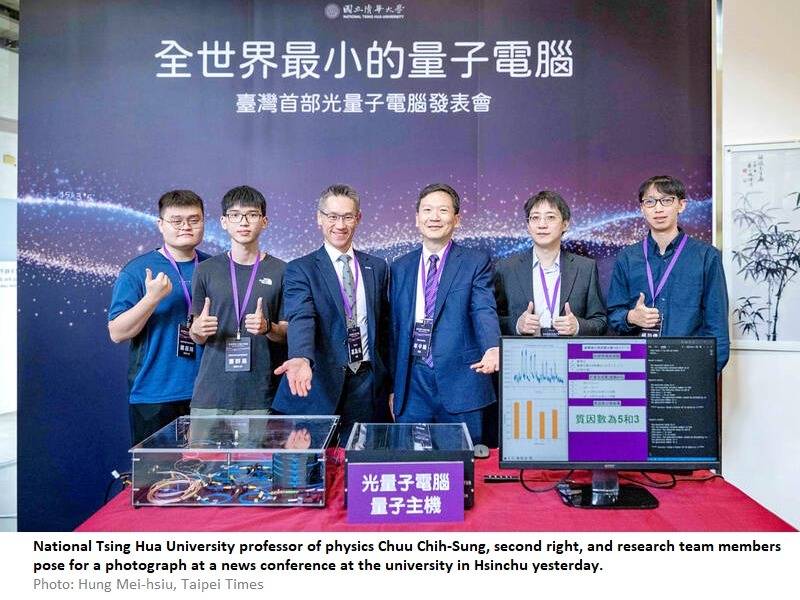
By Hung Mei-hsiu, Wu Po-hsuan and Jake Chung / Staff reporters, with staff writer
A research team led by National Tsing Hua University Department of Physics and Center for Quantum Science and Technology professor Chuu Chih-sung (褚志崧) has developed Taiwan’s first and the world’s smallest quantum computer, using a single photon, the university said yesterday.
Chuu said in the study, which was published in the journal Physical Review Applied last month, that they had resolved the main obstacles for quantum computing development — high energy costs and a low-temperature operating environment.
Chuu said that photons are the smallest possible particle of electromagnetic energy, and his team had devised a way to encode information in 32time bins, or dimensions, of a single photon.
Photons can be kept at a stable quantum state even at room temperature, he said.
Quantum computing is normally prone to information loss and calculation errors from vibrations or magnetic fields, he said.
However, photons have a more extended range of transmission, and they are less prone to interference, which contributes to a unique advantage when developing a commercialized quantum computer, he added.
Traditional computers enact computation on circuit boards, while quantum computing relays information through photonics and enacts computation using quantum physics.
The smallest unit of digital information in a traditional computer is the binary digit, or bit, which can only represent 0 or 1, Chuu said.
However, the quantum bit, or qubit, can be processed as both 0 and 1, a characteristic referred to as quantum superposition, he added.
Superposition enables quantum computing to process complex computations, such as prime factorizations or big data searches, up to 100 million times faster than traditional computers.
University president John Kao (高為元) said the paper’s publication in Physical Review Applied was an excellent milestone for quantum computing, as the device could operate at room temperature and was compact.
Kao said he remembered touring the US’ most advanced quantum computer lab last year.
He was struck by the enormity of the cooling system, which took up a whole room and kept temperatures at extremely low levels, Kao said.
Separately, the National Science and Technology Council has invited Alain Aspect, the 2022 Nobel Prize in Physics laureate, to attend this year’s Quantum Taiwan event, highlighting the nation’s focus on developing quantum technology.
The event would discuss quantum technology, superconducting quantum computers, quantum communications, quantum metrology, sensing and imaging.
National Science and Technology Council Minister Wu Cheng-wen (吳誠文) said quantum technology promises unforeseen computational abilities and could make communication safer.
The seminar is aimed at fostering international collaboration in creating a global platform to further develop quantum technology and ensure that Taiwan is an indispensable member of the global quantum technology development effort, Wu added.
Source: Taipei Times